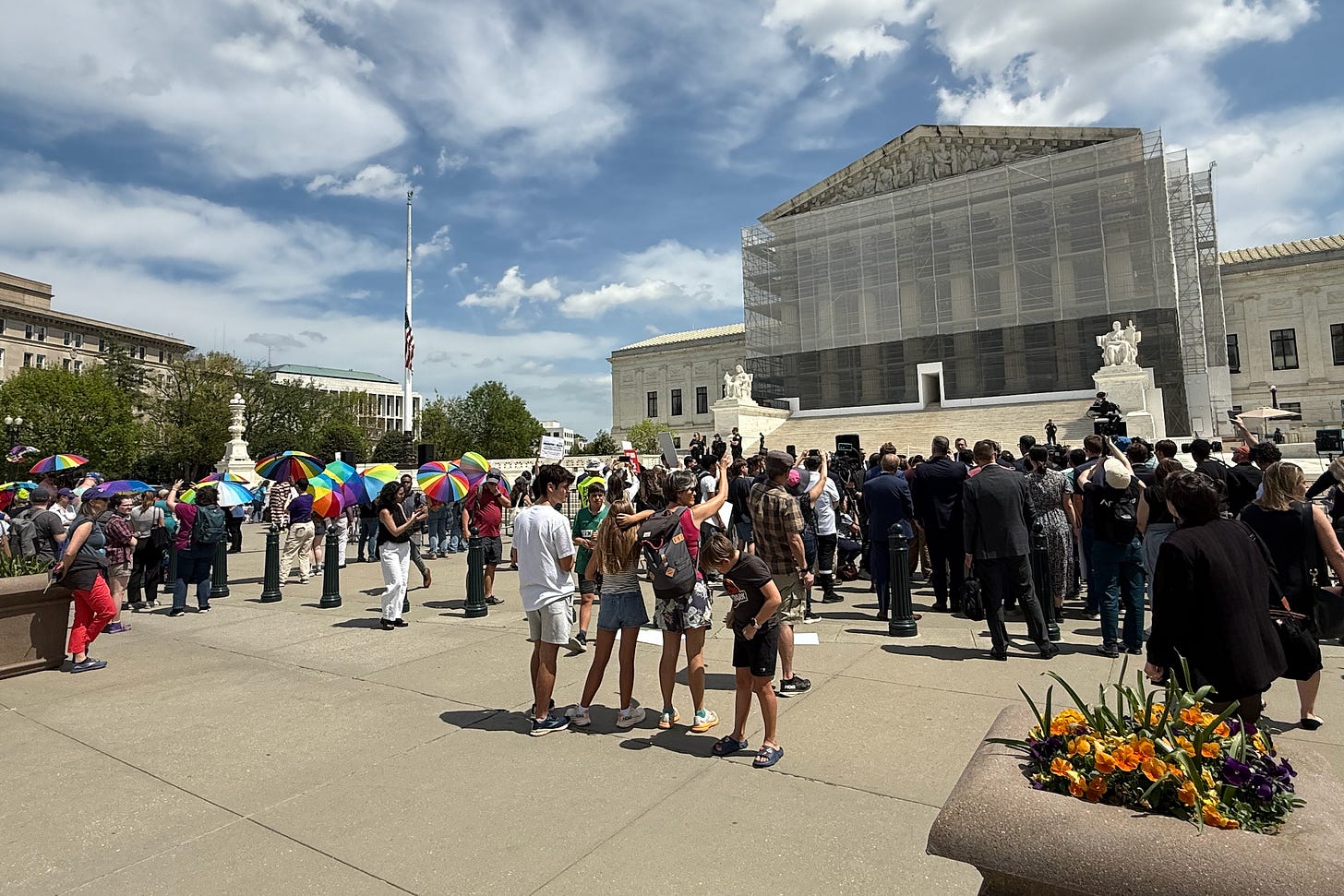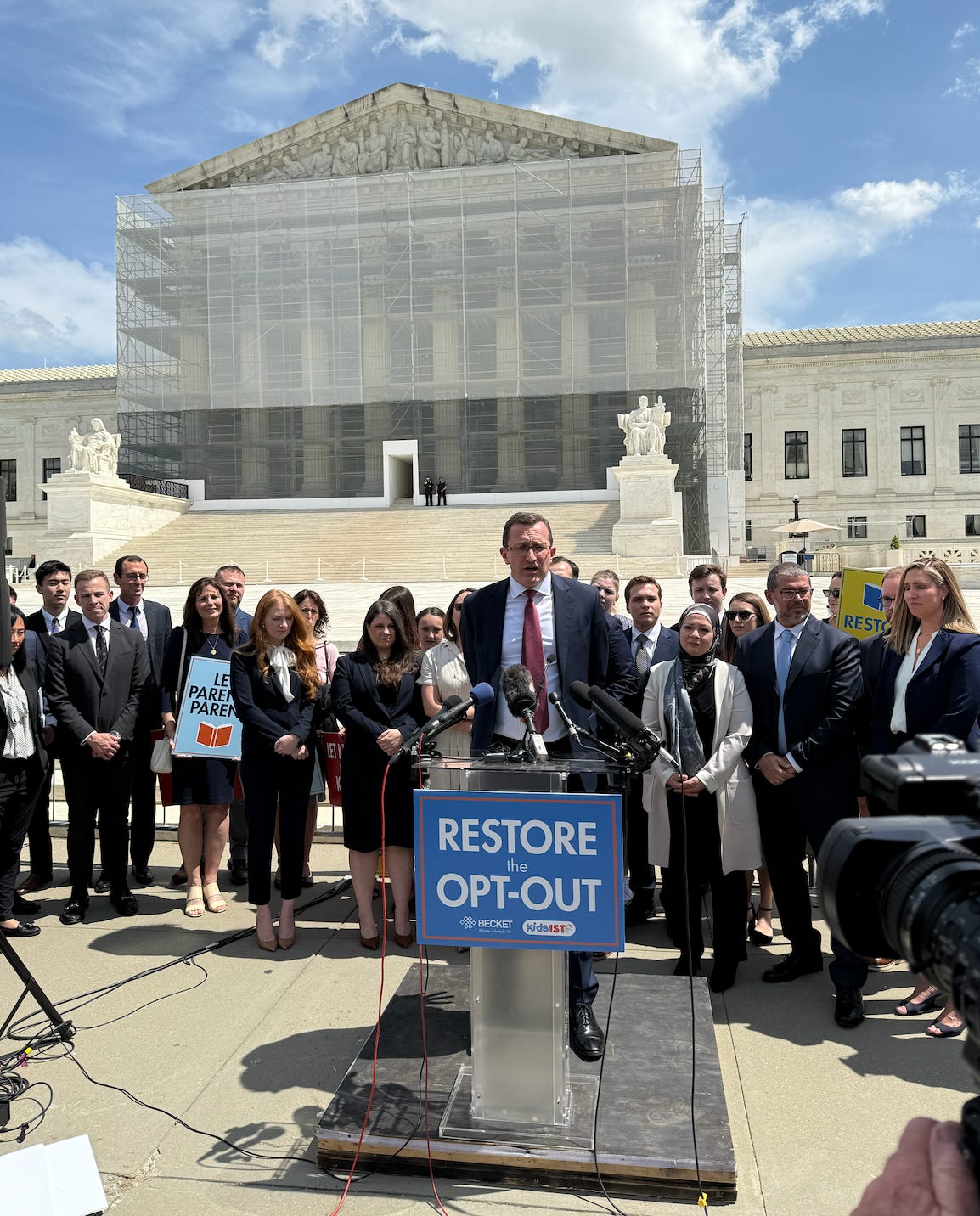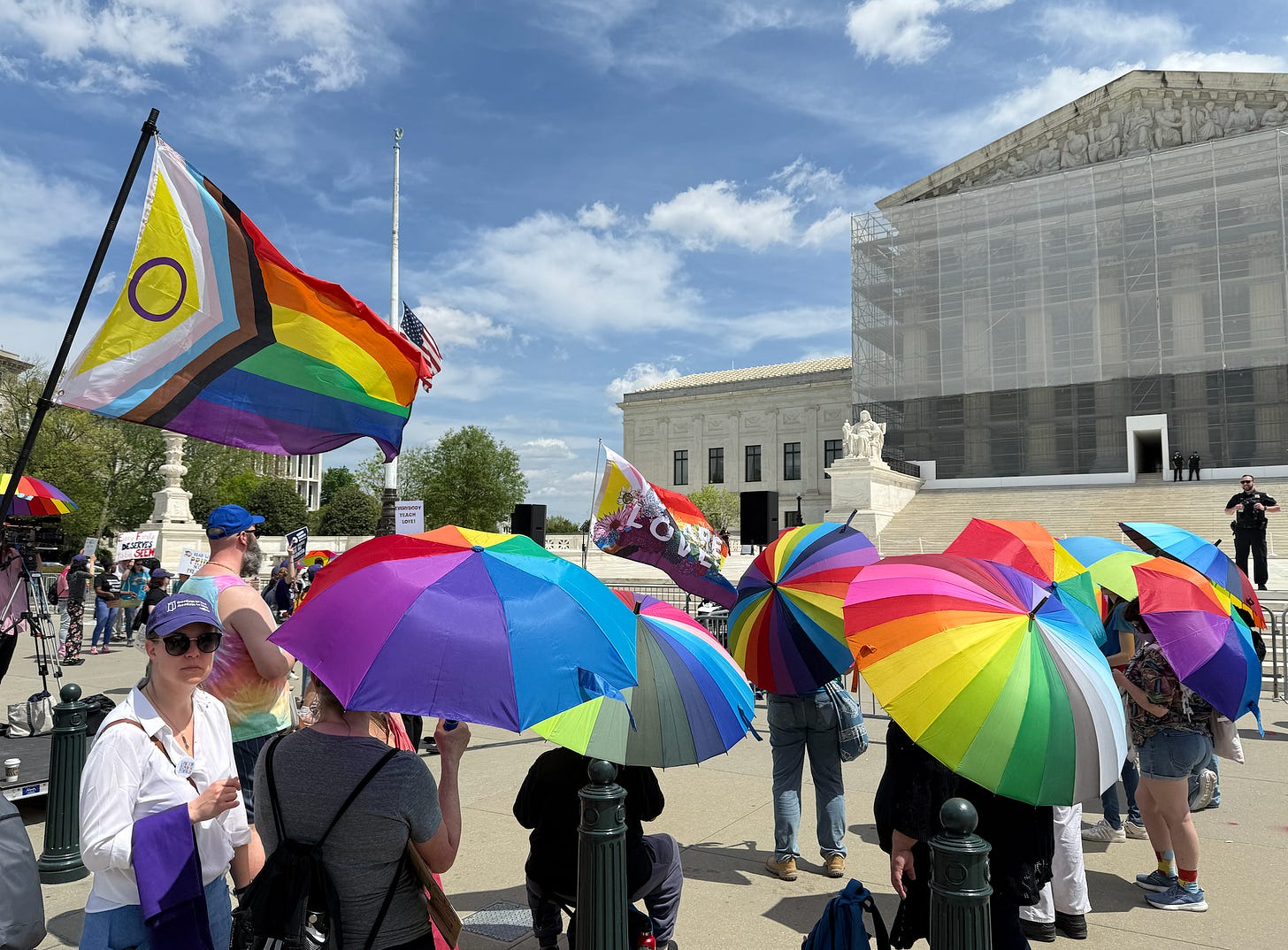SCOTUS conservatives seem eager to increase parents' religious rights in public schools
Tuesday's arguments over Montgomery County schools' story-time sessions included alarming questions about LGBTQ people.
The U.S. Supreme Court’s conservatives appeared eager on Tuesday to side with parents wanting to opt their students out of story-time sessions in Montgomery County’s public schools in Maryland that included a handful of books that contain same-sex couples and discussion of what it means to be transgender.
The question brought to the court by the parents’ lawyers from the Becket Fund for Religious Liberty is not whether schools can do so — as many do — but rather whether the First Amendment’s free exercise guarantee constitutionally requires it.
The school district has argued — and the U.S. Court of Appeals for the Fourth Circuit agreed — that teachers simply reading the books and students being exposed to these ideas do not constitute “coercion” such that parents’ free exercise rights are implicated.
But, in an alarming sign for LGBTQ people, it was clear that at least three of the justices believe that describing queer people accurately — acknowledging their equal existence — amounts to taking sides or trying to “influence” children.
More broadly, and after two-and-a-half hours of arguments at the Supreme Court, it was clear that the argument from the parents — with backing from the Trump administration — is going to prevail. The only real question was how the court will resolve the case. Given the different paths the court can take, though, the answer to that question is important.
It was, however, a lopsided argument that showed how extreme the “religious freedom” arguments have gotten in front of a court that has made clear that it backs religious supremacy over many — if not most — other constitutional rights.
Tuesday’s alarming trio
Justices Sam Alito, Brett Kavanaugh, and Amy Coney Barrett made repeated comments Tuesday that all but made them sound like they were among the parents fighting the school board’s policy.
Kavanaugh, noting that he had lived in Montgomery County throughout his life, told the school board’s lawyer, Alan Schoenfeld, about how “Maryland was founded on religious liberty and religious tolerance, a haven for Catholics escaping persecution in England going back to 1649.“
He then said that he was “surprised” that “this is the hill we're going to die on, in terms of not respecting religious liberty, given that history.“
Addressing the books involved, Barrett also focused extensively on the associated “instructional materials” — despite the fact that the record does not establish whether such materials were ever utilized by any teachers in the district.
At one point, Barrett read from the teacher instructional materials regarding how to address questions about gay, lesbian, or bisexual people — noting that “people of any gender can like whoever they like” — and questions about transgender people. There, Barrett read, the materials suggested:
“When we’re born, people make a guess about our gender and label us boy or girl based on our body parts. Sometimes they’re right; sometimes they’re wrong. When someone’s transgender, they guess wrong. When someone’s cisgender, they guessed right.”
From there, Barrett said that those statements “seem to be more about influence, right, and shaping of ideas and less about communicating respect because it’s less about communicating respect for those who are transgender, who are gay, and more about how to think about sexuality.“
It was a disturbing moment. If Barrett deems it to be about “influence” to literally define what transgender means, then it is not clear to me what Barrett would view as “communicating respect” but not “influenc[ing].”
That wasn’t all from Barrett, who also repeatedly sounded the alarm about people using different “pronouns” — raising questions on the topic with all three lawyers before the court on Tuesday. This included an exchange where Principal Deputy Solicitor General Sarah Harris, representing the U.S. government, stated that referring to a transgender teacher or student by their appropriate pronouns could raise both free exercise and compelled speech concerns.
Alito, meanwhile, got into a debate with Justice Sonia Sotomayor that wove throughout the arguments about whether comments from a girl in a children’s book about her uncle’s marriage to a man reflected discomfort with a same-sex couple’s marriage or was about, as Schoenfeld put it, being “annoyed that [her] favorite uncle is distracted and doesn't have time for her“ because he is getting married.
The word “uncle” appears 18 times in the transcript of Tuesday’s arguments.
This is where we are.
Alito also created an aggressive, completely imagined hypothetical in order to create a Catholic victim, telling the school board’s lawyer:
[S]uppose a school says we're going to talk about same-sex marriage and same-sex marriage is legal in Maryland and it's a good thing, it's moral, it makes people happy, same-sex couples form good families, they raise children. Now, there are those who disagree with that. Catholics, for example, they disagree with that. They think that it's not moral, but they're wrong and they're bad and anybody who doesn't accept that same-sex marriage is normal and just as good as opposite-sex marriage is not a good person.
Now, what if that is what the teacher — the school teaches students?
Schoenfeld, unsurprisingly, told Alito that that is “absolutely coercion.” He continued, though, to explain that it would not be coercion if the school simply taught that people “even same-sex couples” can fall in love and get married — so long as it wasn’t “directly derogatory of a particular set of religious beliefs.“
Alito was aghast: “So the school can teach students certain moral principles that are highly objectionable to parents, and that's okay?”
When Schoenfeld said yes, Alito retorted, “They can't opt out?”
Schoenfeld repeated his baseline point: ”That does not burden free exercise.”
And yet, from the arguments on Tuesday — and despite a fairly quiet morning from Chief Justice John Roberts — it was clear that a majority of the court disagrees.
The left’s attempts at pushing back
From the three Democratic appointees, each approached arguments from a different, pushing-the-boulder-uphill position on Tuesday.
Sotomayor, as noted, was here for the merits fight — defending the books and challenging the effort to declare that discussion of people’s lives constitutes coercion or a constitutionally cognizant burden on parents.
Justice Ketanji Brown Jackson asked some similar questions, but also got into what became fairly pointed disputes with Barrett and Alito about the record and the nature of the right at issue.
“I guess your colloquy with Justice Barrett makes me wonder whether this case is really the right vehicle to evaluate any of these issues,“ Jackson asked Eric Baxter, the Becket Fund for Religious Liberty lawyer representing the parents. “[W]e don't even know how these books are actually being used in the classroom.“
Jackson also raised a discussion about whether it can burden a parent’s free exercise right where parents have the ability to choose sending their students to a private school or to home school them, in addition to sending them to the public schools.
“[I]n so many other constitutional doctrines, we don't focus on whether people actually can afford to protect their rights,” she said, noting that “usually … we say: But you still have the right to get an attorney in a civil case even if you can't afford it, right? So we don't focus on whether or not they can actually do it. They have an option.“
Justice Elena Kagan from the start was focused on the line-drawing questions raised by the parents’ arguments — and the broad implications of their argument.
“I guess I'm interested in what the nature of the rule you're asking for is,“ Kagan told Baxter. “[A]s you've answered some of these questions, you've basically said: ‘Well, you know, my clients have religious principles that conflict with what is being taught.’ … [D]oes it go that far?”
Ultimately, Baxter agreed that — as Kagan put it as a question to him — he was seeking a rule asserting that: “When a religious person confronts anything in a classroom that conflicts with her religious beliefs or her parents' that the parent can then demand an opt-out?”
Where arguments ended
When Kagan asked Baxter whether there were any lines that could be drawn under his rule, and he said yes, Kagan responded, “But what I'm hearing you saying is the burden is basically up to the parent to decide this conflicts with my religious beliefs, I want an opt-out. Is that correct?“
Baxter’s response: “Yes.”
That is the rule they want.
In response to a question from Justice Clarence Thomas, Harris said that “the framework we're advocating for is to view this as putting a price on a public benefit of public education at the expense of foregoing your religious beliefs.”
Due to the ranges of cases addressing free exercise claims, however, there are multiple ways the court could resolve the case — as was the focus of much of Justice Neil Gorsuch’s questioning on Tuesday.
And though the parents, Becket Fund, and Trump administration are seeking a far-reaching rule, there was also discussion about the particular treatment of the issue by the board here — including an overnight policy reversal and later comments from board members that even their lawyer acknowledged on Tuesday had been “intemperate.” It is possible that the court could resolve the issue on those discriminatory treatment grounds, similar to the court’s 2018 decision in Masterpiece Cakeshop v. Colorado Civil Rights Commission.
But, if the court goes further, as many of the conservatives appeared ready to do, the result could be dramatic for public schools — and, with it, public life — going forward.
In response to comments from Baxter that these issues aren’t often litigated at the line-drawing areas that concerned Kagan, Schoenfeld responded with a warning.
“[O]nce this Court constitutionalizes that prerogative, you're in a completely different world in terms of parents’ willingness or ability to invoke it,” he told Kagan, later telling Jackson, “I think you'll see an entirely different generation of challenges to school curriculum.“






Then the parents should put their kids in a private school. A public school is a school for EVERYONE!!! If they want to educate their kids to be small minded and unaccepting of others , they don’t even belong in public school—-
This style of argument just begs for the "Green Cheese" use case. All you need is someone whose religious belief is dogmatic in the belief that the Moon is made out of Green Cheese (or that the Earth is flat, or a Satanist, what have you) to basically object to any science courses where the Moon is mentioned NOT being made of Green Cheese, or the Earth is represented as NOT flat, or where Satan is not the lord of us all. Conservative arguments, even to the Supreme Court, never seem to adequately account for beliefs that are not their own sharing similar rights.